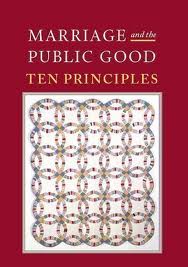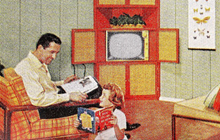8. It normalizes an abnormal behavior. That it is an abnormal behavior is clear to any disinterested observer. It hardly needs mentioning that the male and female bodies are made for one another, in obvious ways, and in more subtle ways which medical science is only beginning to discover. Before the current wave of political advocacy, many psychologists who studied homosexual men did come to some plausible conclusions about same-sex attraction. From their studies and from what I know about the nature of boys, I offer the following alternative theory to explain male homosexuality.
I accept the word of male homosexuals who say that they have always felt attracted to other males. There is no reason to doubt them on this. They believe that this attraction makes them different from their brothers—and this is where they go wrong. The plain fact is that all boys have a deep need (again, this is something hard to explain to women) for male acceptance and affirmation. All boys are attracted to the athletic, the popular, the gregarious, the cheerful, the clever boy, or man, as the case may be.
This need is expressed in various ways: sometimes by shutting girls out of the club; sometimes by horseplay; sometimes by the violent high spirits of a gang; sometimes by initiation rites involving blood; sometimes by sworn devotion to a higher cause. In every boy there is a strain of the Tom Sawyer who organizes the other boys around him, or of the boys who look to a Tom Sawyer. The art of every culture testifies to these powerful (and difficult) friendships: Gilgamesh, Huckleberry Finn, David Copperfield, Kidnapped, The Iliad, Star Wars.
From this single assumption, all else follows. For suppose the boy has a cruel father, who makes fun of him for being slow or fat or clumsy. Or suppose he is naturally shy, and is rejected by the local boys—as he watches their rough games resentfully yet longingly from the kitchen window. Or suppose the boy’s older brothers ignore him, and he watches in envy as they catch the football or flirt with the pretty girl. Suppose a boy is rejected by the most important males in his life. The longing for male companionship does not go away; and remember, boyish friendship is expressed with an active and frank physicality.
What happens now may depend on other factors: the presence of some one friend in whom he can trust, or a loving father who will make rejection by the other boys pale in importance. Failing that, the boy must struggle on his own to define himself as a boy, or he must accept that he “deserves” to be rejected by the others, because he is not a real boy. This struggle is for the central fact of the boy’s existence—and that, too, is unwittingly supported by homosexuals, who alone among people of all kinds of sexual habits associate their very identities with their longings.
When the boy reaches puberty, the longing assumes a new character, influenced by the boy’s new capacity for sexual arousal and his developing, and often chaotic, feelings of sexual desire. The same kind of bodily fooleries that help form the identity of other boys—for instance, nude bathing or semi-public urination or the common shower after an athletic contest—become for him moments of great dread, or desire, or both at once. Hence the compulsiveness of the homosexual’s behavior: Like other compulsives, he scratches at a wound that will not heal; he visits again and again the painful memory; he aches to fulfill a longing whose source he can no longer rightly recognize.
Most boys grow out of this silly stage; the homosexual, who was denied the chance to undergo it in the normal way, returns to it, as if compelled. Hence the exhibitionism and other forms of public behavior that one might expect in a prepubescent boy—if the boy were deeply disturbed.
What the male homosexual longs for, sexually, is what every male needs: affirmation by other men. It is to know that you belong, you are a man, you can be relied on in a fight, you have what it takes. If a boy is given this affirmation, then, barring a rape or something else unspeakably bizarre, he will not become a homosexual.
This, too, is a plain fact: It is a sufficient condition for the nonappearance of the syndrome. If a father affirms his son physically (for the rough touch of a good father’s love is never forgotten by the son), then the son will identify with the father. He will know he is a boy, to follow his father in marrying a woman and having children by her.
Thus, male homosexuality is a corruption not of the relations between men and women, but of the relations between men and men: It is an aberrant eroticization of male friendship. And that explains the unimaginable promiscuity. What a man seeks in a woman is not what he seeks in a man. Husband and wife may be “friends,” but they are also less and more than that. My wife is not an alter ego; we do not stand side by side to conquer the world. But I find in her what I lack in myself. She is the mysterious one who is not like me, and my love for her is quite unlike my love for my friend, who is like me.
There is nothing casual about marriage, but friendship descends from the summit all the way down to pleasant and passing acquaintances. If it is friendship that male homosexuals seek, then we might predict many of their otherwise inexplicable behaviors. Friendship is not exclusive; one can never have too many friends; friendship is often celebrated best in boisterous groups; to live even a week or two without the feeling that one has a friend is agonizingly lonely.
The homosexual knows better than anyone that something has gone awry with him. Hence his own vacillation between insisting that he is normal and his flaunting of behavior that, if performed by anyone else in any other situation, he himself would despise. “Queer Theory”—the name speaks volumes.








